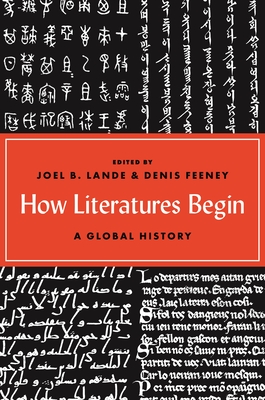

 Princeton University Press
Princeton University Press
How Literatures Begin: A Global History


Key Metrics
- Joel B Lande
- Princeton University Press
- Hardcover
- 9780691186535
- -
- -
- Literary Criticism > Comparative Literature
- English
 Secure Transaction
Secure TransactionBook Description
A comparative history of the practices, technologies, institutions, and people that created distinct literary traditions around the world, from ancient to modern times
Literature is such a familiar and widespread form of imaginative expression today that its existence can seem inevitable. But in fact very few languages ever developed the full-fledged literary cultures we take for granted. Challenging basic assumptions about literatures by uncovering both the distinct and common factors that led to their improbable invention, How Literatures Begin is a global, comparative history of literary origins that spans the ancient and modern world and stretches from Asia and Europe to Africa and the Americas.
The book brings together a group of leading literary historians to examine the practices, technologies, institutions, and individuals that created seventeen literary traditions: Chinese, Japanese, Korean, Indian, Greek, Roman, Hebrew, Syriac, Arabic, English, German, Russian, Latin American, African, African American, and World Literature. In these accessible accounts, which are framed by general and section introductions and a conclusion by the editors, literatures emerge as complex weaves of phenomena, unique and deeply rooted in particular times and places but also displaying surprising similarities. Again and again, new literatures arise out of old, come into being through interactions across national and linguistic borders, take inspiration from translation and cultural cross-fertilization, and provide new ways for groups to imagine themselves in relation to their moment in history.
Renewing our sense of wonder for the unlikely and strange thing we call literature, How Literatures Begin offers fresh opportunities for comparison between the individual traditions that make up the rich mosaic of the world's literatures.
The book is organized in four sections, with seventeen literatures covered by individual contributors: Part I: East and South Asia: Chinese (Martin Kern), Japanese (Wiebke Denecke), Korean (Ksenia Chizhova), and Indian (Sheldon Pollock); Part II: The Mediterranean: Greek (Deborah Steiner), Roman (Joseph Farrell), Hebrew (Jacqueline Vayntraub), Syriac (Alberto Rigolio), and Arabic (Gregor Schoeller); Part III: European Vernaculars: Romance Languages (Simon Gaunt), English (Ingrid Nelson), German (Joel Lande), Russian (Michael Wachtel); Part IV: Modern Geographies: Latin American (Rolena Adorno), African (Simon Gikandi), African American (Douglas Jones), and World Literature (Jane O. Newman).
Author Bio
After receiving his PhD at the University of Chicago, Lande was awarded a fellowship by the Princeton University Society of Fellows in the Liberal Arts. Since July 2014, he has been Assistant Professor in the German Department. Over the years, Lande has spent extensive time at European universities, including the Universität Konstanz, Universität Basel, and the Humboldt Universität in Berlin.
In addition to the study of eighteenth- and early-nineteenth century German literature, especially drama, Lande’s interests and competencies reach into other areas of European literature, especially classical antiquity and its various receptions. He maintains an active interest in the German philosophical tradition from Leibniz to Wittgenstein as well as its contemporary Anglo-American and European interpretation. Broadly speaking, his work concentrates the relationship between literary form and transformations in other spheres of knowledge between the seventeenth and nineteenth centuries.
Lande is the author of Persistence of Folly: On the Origins of German Dramatic Literature appeared in Fall 2018 in the Signale Series published by Cornell. This study argues that the figure of the fool played a constitutive role in the emergence of a dramatic literature in the German language. The book uncovers the dramaturgical logic underlying the fool’s appearance in plays from across the seventeenth, eighteenth, and early nineteenth centuries, including texts written by long-forgotten authors as well as major literary works by Lessing, Goethe, and Kleist. In addition, Persistence of Folly argues for the abiding importance of the fool in a wide range of discursive fields, extending from political, moral-philosophical, and medical discussions to treatises on rhetoric and poetry.
A co-edited volume entitled Barocke Figuren: Gestalten der Zeit im Barock appeared in 2013. Together with Jocelyn Holland, he edited the 2019 German Issue of MLN on the topic of anomalies. In addition, he and Denis Feeney are co-editing the collectively written history How Literatures Begin: A Global History (under contract with Princeton University Press). Recent essays on theater history and aesthetics as well as the history of science and early modern political thought have appeared in journals including MLN, the Goethe Yearbook, the Deutsche Vierteljahrsschrift, and the Zeitschrift für deutsche Philologie.
For the academic year 2019–2020 he is on research leave at the Leibniz Zentrum für Literatur- und Kulturforschung as a fellow of the Alexander von Humboldt Foundation.
Source: Princeton University
Videos
No Videos
Community reviews
Write a ReviewNo Community reviews